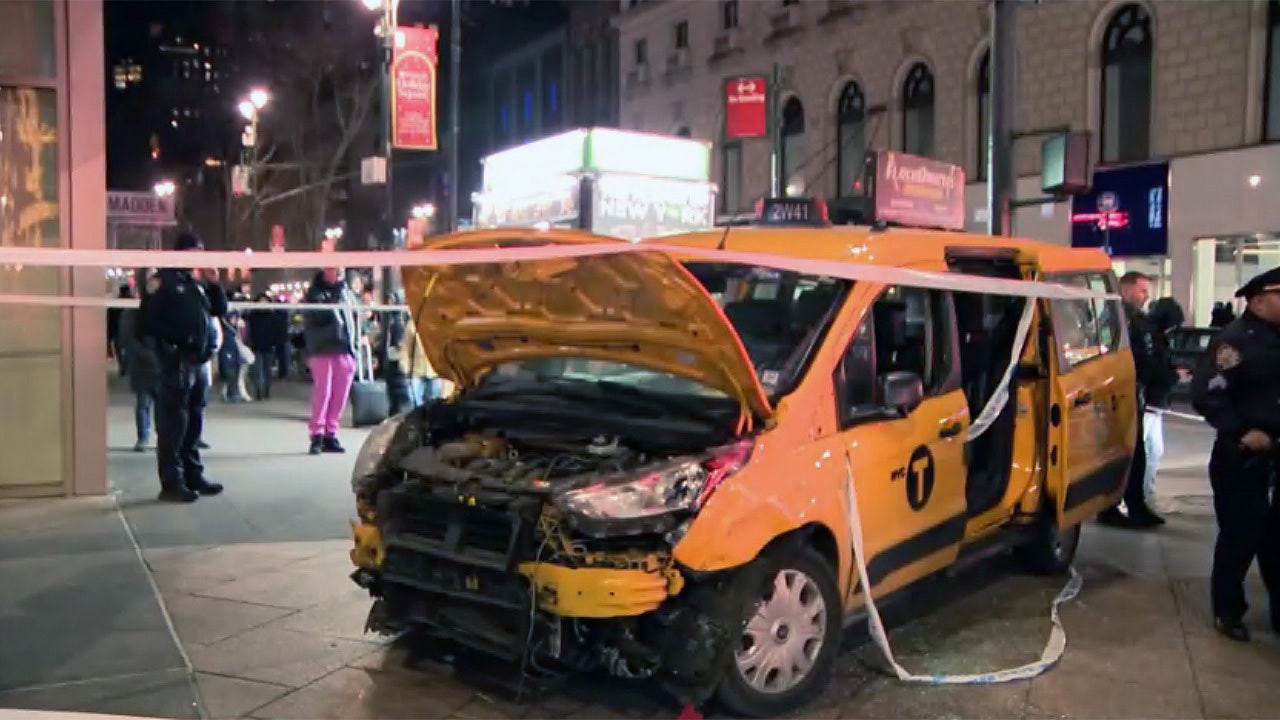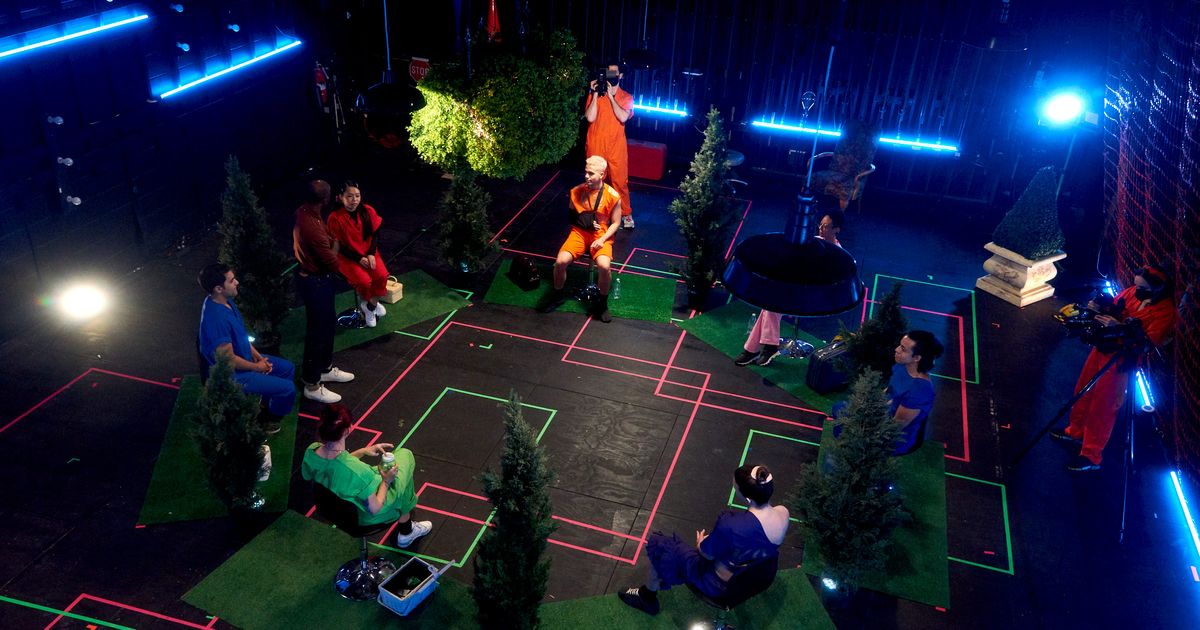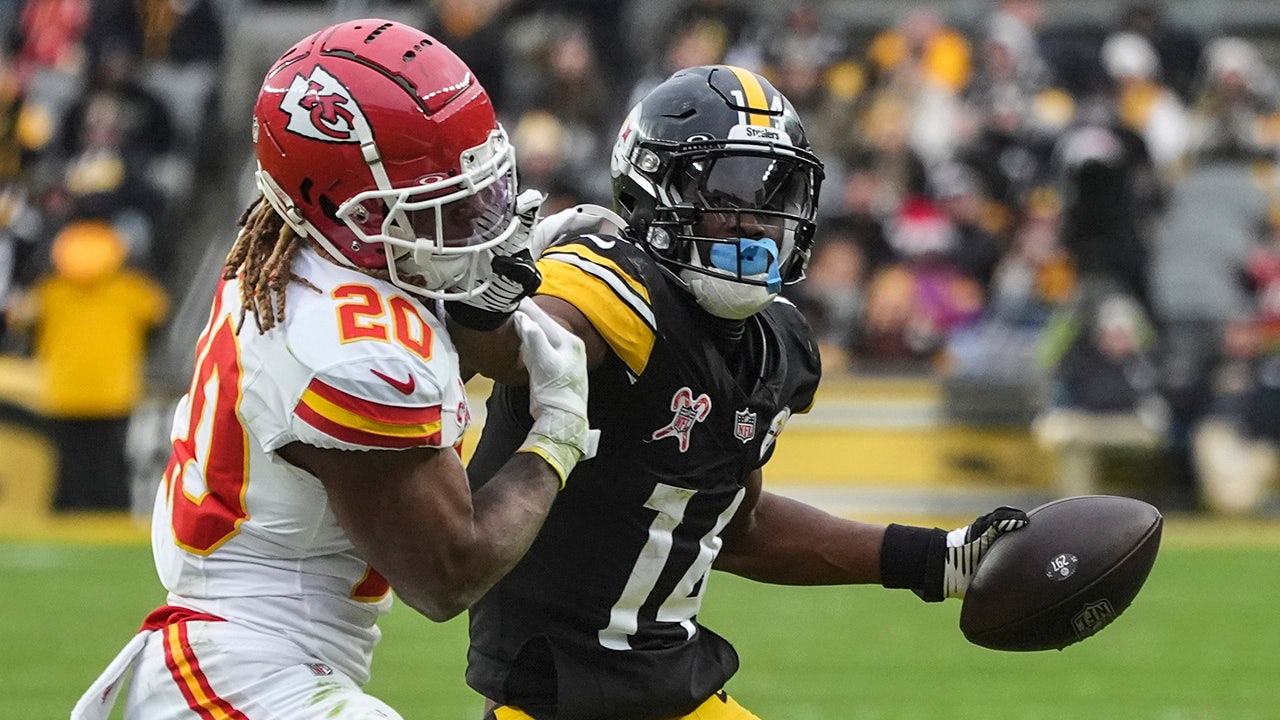A gentle-voiced, rather professorial man, Calvin, stands at a chalkboard. He paraphrases philosopher David Hume on reason and passion before posing a barrage of ethical questions, provoking an eager group of beautiful people into explicating their morals. Calvin walks them through the “trolley problem,” a thought exercise about increasingly horrible ways to save five commuters, and he listens patiently to the rather sophomoric reasoning of his quasi-pupils. To those who watched four seasons of The Good Place, it may seem familiar, and yet … we haven’t actually stumbled across a lost episode. The man at the chalkboard is actually the choreographer and theater-maker Raja Feather Kelly, and the eager students are his company, playing the contestants in an eerie theater game show.
The KILL ONE Race is being deliberate when it so closely echoes its television forebear — the odd show wants you thinking about The Good Place and any other philosophy-lite entertainment you’ve consumed over the years. (Kelly and his team, the feath3r theory, have devised such a bizarre scenario that any touchstone you can reach for will add stability.) The seven-episode digital series is pretending to be a reality-television competition, but it’s actually trying to put viewers, not players, through their moral paces. At various points in the “contest,” we are encouraged to pause the video and play along so that we too can ask ourselves and our loved ones, “When is lying not a sin? What violence is permissible? Does any moral code survive contact with the real world?”
Within the fiction of The KILL ONE Race, the participants — all of whom are 24 years old — are in competition with one another. They must demonstrate ethical excellence in order to win. In the first episode, the show’s smooth-voiced host, Marques Zat (played by Lucien Zayan), lays out the stakes. After a week in the race, the winner will die and go to “the Empire,” a sort of heaven designed for and by the winner. (“It’s a you-topia,” he says, in a butter-melting French accent.) During short video confessionals, the contestants talk about how much they’ve dreamed of being chosen to be in the race and also how they’ve always fantasized about their deaths. The Empire is everything they dream of. A camera following Zayan around the Playwrights Horizons stage stops for a moment, and he faces out into the empty audience. “I can promise you it’s real,” he says — to no one.
Each individual episode can feel slow, though they only run around half an hour. The ethical musings do feel rather like conversations you had when you were 24 — a little pompous, a little silly, but always a bit too long. Constrained by the pandemic to shooting on the Playwrights Horizons stage and becalmed by a rather cool, dim lighting scheme, the episodes can drift toward the tedious. Still, there’s a deliberateness even to the show’s monotony — all the contestants (gentle Tommy, sweet Cosmo, quiet Mandy) are good and trying to be better. One episode in which the group must collectively choreograph a dance shows us that there’s a great deal you can accomplish with cooperation and kindness — you just don’t get drama.
Stay with the project, though, and try to reach the later episodes. I can’t really give too much away because I’m not sure I understand what I saw, nor what I’m meant to believe. (The more you try to work out how Kelly came up with The KILL ONE Race, the more lost you get — if you try to track down the claim that it is based on a book, you’ll wind up down internet rabbit holes that twist back on themselves.) After a while, the show’s careful drilling into moral certainties does finally hit a nerve. The non-game world begins to penetrate the hermetic sphere of the theater, and the players have to abandon their abstractions. There aren’t actually many runaway trolleys that we’ll need to contend with in the real world. Instead, those careering streetcars are people — they’re the ones who come barreling at us, forcing us into cruelty and compromise and pain.
While we’re talking about pain, are the 20-somethings … ok? The nihilist humor in The KILL ONE Race finds its echo in Capricorn 29, Alex Hare and Julia Izumi’s digital play with music, co-produced by the Off–Off Broadway theater the Tank and the Post Theatrical festival. In this cleverly constructed video production, the bell tolls a little later than it does in Kelly’s show — this time, at 29. According to a Logan’s Run–inspired conspiracy theory “revealed” by the show, millennials have started simply disappearing as they enter their third decade. (That paranoid murmur you’ve heard that you’re finished if you don’t make it onto a 30 Under 30 list? Listen to it.)
We spend the 50-minute show eaveswatching on a mostly invisible User, a woman on the verge of the big 3-0. Her own search history reveals her character, as she seems drawn to videos made by an estranged friend, Jess the Craftess (Kalyne Colman). Lonely, she’s easily distracted, typing “cutest puppy videos ever” into her Google search bar, and the show itself is distractible, so it veers into random musical numbers that accompany simple line animations.
In this peripatetic scramble (what is the show and what is the entr’acte?), Hare and Izumi manage to make the show blend exactly into the experience of the extremely online. We watch as a cursor clicks on ads and texts and videos; then it taps and scrolls just when our own attention span demands new stimulation. The User (Lindsey Steinert) YouTubes her way around — until an innocent interest in skincare leads her into the clutches of the conspiracy. Can this mysterious abduction be prevented? Do the sudden video montages of men (James Bond, Rambo, Rick Astley etc.) racing down hallways and alleyways hint at escape or a closed maze?
From Patricia Lockwood’s No One Is Talking About This to Lauren Oyler’s Fake Accounts, we are in a golden age of people explaining to those of us online what it’s like to be online. And it’s in this way that I think Capricorn 29 is actually brilliant. The show does get unsteady when it looks at its human characters — the interpersonal trouble between the User and Jess seems, frankly, artificial. What’s real, though, is the way every maker on the team handles and embroiders the digital fabric. In one gorgeous lyric, a voice tries to explain what they’re up to. “The wall is a mirror,” it sings, “the mirror is a door.” I think I caught my own eye in the reflection off my computer screen, but it could have been the internet, looking for its audience.
The KILL ONE Race streams via Playwrights Horizons through July 4.
Capricorn 29 streams via posttheatrical.org through the Tank through June 16.












